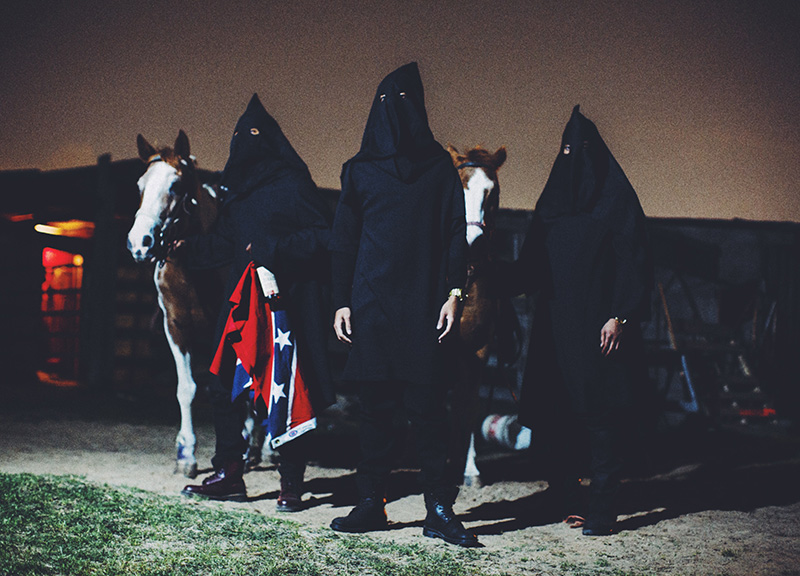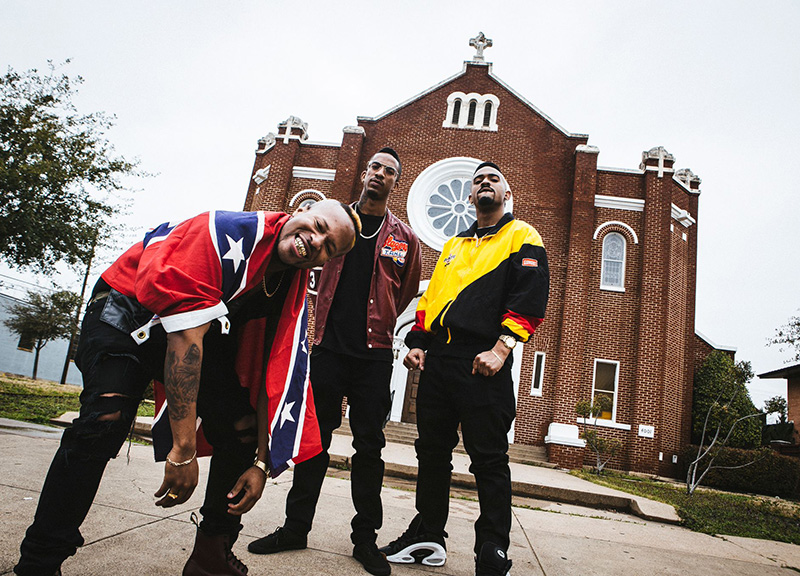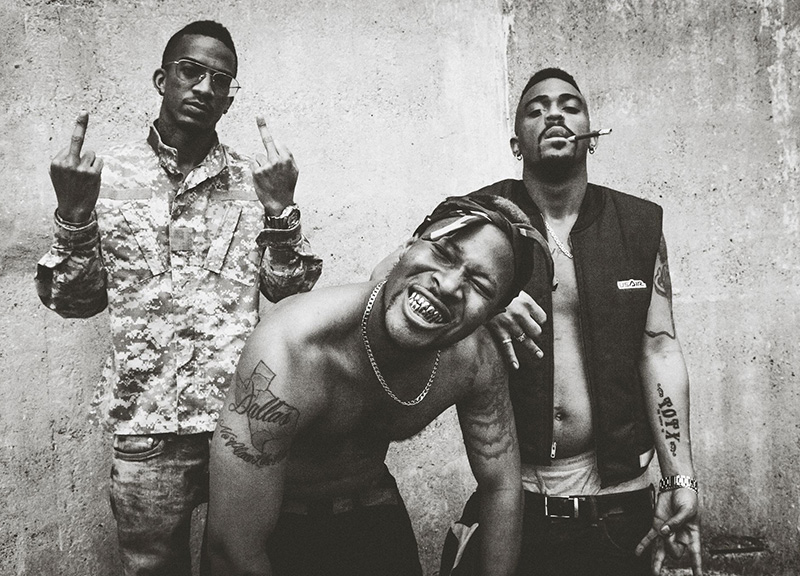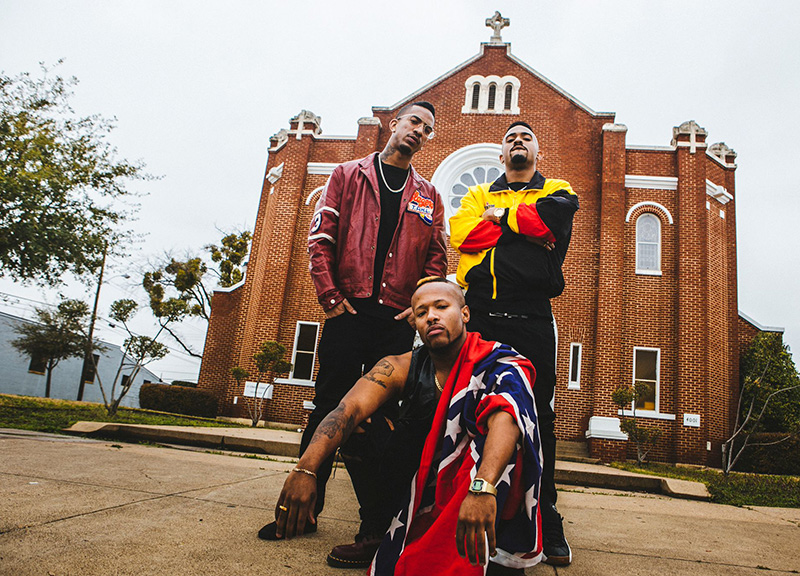We Talked To The Outfit, TX About Its New Album, The Confederate Flag, Racism and Jesse Jackson.
I’m sitting directly beneath a Confederate flag.
Well, to be deadly accurate, it’s the battle flag that was used by the Army of Northern Virginia and the Confederate Navy as they engaged in combat. The design has its roots directly tied to white supremacy, though.
Let me explain: In 1863, William T. Thompson, a newspaper editor from Savannah, dreamed up the second Confederate States of America Flag. The design was simple; just that large X, with the stars running through the pipes and bleeding red around it. The difference here is that this design of Thompson's was just a graphic placed in the left corner. The rest of the flag was completely white. The white specifically symbolized the supremacy of the white race.
And yet here I am, sitting in a living room with Mel, JayHawk, and Dorian of The Outfit, TX, along with their manager Rosalinda Ruiz. That's four black men and a Latina woman, all being stared down by a symbol that hasn't always been on, let's say, the best of terms with people like us. However, like the second CSA flag that Thompson created, this one has a design that's a peculiar version of what we're used to. It has flames emblazoned on the bottom of it.
Those flames are The Outfit, TX's own design additions. And that's a decidedly punk rock move for the rap group. As opposed to a mere, lazy appropriation of a hateful image, it represents a conscious decision to burn it all down.
As I sit with this crew, we discuss at length what the hell that flag is all about, as well as the group's third album, Down By The Trinity, which finds the group taking young manhood by the horns and exploring the emotions that come with it.
Mel tells me the album, officially released on November 18, is a deep dive into the serenity that comes with adulthood. The album is considerably darker than previous releases like Starships & Rockets: Cooly Fooly Space Age Funk and Cognac/Four Corner Room. But, to JayHawk, it's dark in the way that a second line in New Orleans is: “It's pain, but we're getting past this pain,” he says. “This is the time where we're getting all that pain off of our shoulders. And we're fixing to celebrate that shit.”
On top of all of the above, we also chatted about Jesse Jackson's hair, racism and the importance of rappers as journalists, which is a role that Mel, by the way, has taken to quite well.
Read our discussion below.
Your new video for “Highs & Lows” has strong imagery. You're kind of flipping the mainstays of Confederate and Klu Klux Klan imagery on their head.
Mel: Let me ask you: When you think about the Klu Klux Klan, what do you think about?
I think about racism. I think about people dying. All that type of stuff. Deep South.
Mel: When you think about the actual organization, what do you think about?
A brotherhood of racism. White supremacy.
Mel: I agree. I think we all agree. Now, side note: Are you familiar with the Black Legionnaires?
No.
Mel: There was an organization known as the Black Legionnaires, and they weren't black. They dressed in black robes — and there was another name for them too, I can't think about it off the top of the head, but they dressed in black robes and did worse than the KKK. That's just a side note. But, our point in flipping the color of the robes and doing what we're doing is… the KKK, what they're doing, the reason that they robed themselves as they became more of a racially motivated organization is obviously to hide their identity and obviously because they go out and they terrorize. So, our point in doing that in “Highs & Lows,” for instance, is because that's exactly what we're doing. We're terrorizing. Not in a racially motivated way — still hateful, absolutely full of hate — but not towards another ethnic group. Just hate period. You know emotions are what they are. Spirits are what they are. A lot of times, as a people we're OK with love stories. But what about hate stories? We deal with that shit. We love The Notebook, every woman I ever met loves that movie.
For black women, it's actually Love & Basketball
Mel: [Laughs.] But every black woman I know loved The Notebook better because it's a better movie! It's just sappier than a bitch — they died together — you feel me? But, what The Notebook and the like don't necessarily deal with is — and everybody that's been in love, in real love before, in love and then lost that love — hate too. Many different variables can make you hate a person, make you hate life, make you hate God. Make you… hateful. A lot of times, the spirit deals with that for longer than just a got damn five-minute scene in a movie, then all of a sudden they fucked, then it's back cool. In short, hell yeah, we get garbed up, we put our black on and we feel like hating. But not hating white people or hating Latinos. Just hating, period.
Dorian: It's definitely the adapting of those symbols as our own — 'cause they are just that, they're just symbols. They do mean things to a lot of people, they mean things to us too. But sometimes it's about growth and it's about just progress. And you said “Old South,” you know what I mean? That's exactly right —Old South. [But] we're in the New South now, where we interact with each other in a way different fashion. These are images still to this day that people from the south, from Texas, that we still see, prevalent. It's still out there. Let's not act like it went away and that it was just a part of the Old South, It's still here, and we'll put it in your face with it too. So, it's just a combination of those two things. Putting it in people's faces and moving forward, actually progressing. We're gonna deal with it, finally, and not just act like we're only hurt. We'll move past that hatred. That's why I think a lot of the video was definitely the emotions, like how emotions kind of just have this cycle and you just go through your certain emotions.
Mel: That's a perfect way to put it. I think it's like the cycle of pain or like the human spirit's way of dealing with pain. That was the point. If you watch the video, for those that didn't get it, it's separated in acts.
There’s four different acts, right? Anything to add, JayHawk? I see y'all have the Confederate battle flag out here in the living room, hanging prominently. It's another instance of symbolism and imagery. What does that flag mean to y'all? Either or. Whichever way you want it. Yeah, you just don't talk about it. Why do you think it is that rappers are the ones that are the most vocal, or the most heard, when it comes to these issues? Why'd you name your album Down By The Trinity? You don't really hear people talk pridefully about the Trinity that much.
Mel: Actually, it's five. I think remembrance is the last act. Y'know, 'cause that is how we do it. Let's say Drew Blackburn had a first love in high school and she cheats on him — yeah, yeah, eventually you hate that bitch, shit. She a bitch, she a hoe, she a slut, she all of the above. But then, y'know, at the end of it, you might remember and never forget. But we forgive, hopefully, 'cause if you don't forgive you just stuck in the cycle. And then you might get back with her and realize “Ahhh, she didn't cheat, I'm not even married, it's not adultery.” I've done that — that exact thing I just laid out, literally. Had to go through the process of what the fuck. And then I just rethought what society taught me was love and fidelity. I'm not married to nobody and my grandmama is 73 years old and she reaffirmed it: Until you married, you haven't cheated on anybody. Just know that. Having a boyfriend or girlfriend is cool and it's respectable, don’t get me wrong. But let the bible tell it, let your taxes tell it. That's what it's about. That black and those robes and that hood and the video and shit like that, it's about exactly what those acts say. It's about processing pain.
JayHawk: Nah, I ain't gonna beat a dead donkey more dead.
Mel: You're asking what does the flag mean or what our representation of the flag means?
Mel: That's two different questions. See, we utilize the flag. You're sitting up under the flag that's got airbrushed flames all over it. Obviously, we don't rep the flag as it stands; we rep the flag with the flames ran across that bitch. That's kind of “our set,” reason being is because the flag… a lot of people have a misconception that the flag is [that] flag is that particular flag, like you said. The battle flag is attached to slavery, but that's not the case at all. That wasn't implemented until the '50s and '60s during desegregation. And so it was utilized to represent the fact that those people did not want to integrate. So the flag represents hate, another image of hate. By burning it, thus burning down not only the idea of hating a group for no other reason that you're scared or whatever that case may be, you have these preconceived notions of burning down along with that the larger concepts of a lot of this old southern bullshit we've been dealing with, kind of moving from the Old South and all the lovely things that made us who we are. But the sad truth of the matter is that we pass those things down to our grandkids and our great grandkids, and we teach them to hate, we teach them to be racist, we teach them that black people in Louisiana are thugs, criminals. Then we teach sadly on the flip side that some black parents and grandparents, uncles and cousins teach their younger baby cousins, kids and nephews to be these gangsters and be these stereotypes. People do this to people, this ain't the universe, y'know, and so, it's us recognizing that we got to, at some point in time as a human race, evolve and move forward. And that's what it means, the Confederate Flag with the flames on it which is our flag, not the Confederate Flag, with the flames on Confederate Flag representing the burning down of the old guard and the shift of the paradigm.
JayHawk: Because all of a sudden it's become a big deal — as if Confederate flags just now started becoming a part of culture. We've been seeing this, especially in Texas and in the South. Confederate flags ain't went nowhere. They've been here. They've been on trucks. They've been on porches. It's been here. We're trying to get people to understand that it's not as big of a deal, per se, that people are trying to make it worldwide and nationwide. We've almost got to the point that we damn near got past it and, all of a sudden, it's put back in our face. So, we're trying to recreate racism and hate in the culture — and we don't have no room for that.
Mel: At the same time, too, a lot of it is still present. It's not like the Earth is full of 18-year-olds. And even some of those 18-year-olds, for whatever reason, whether they were taught or it's been fostered or whatever, they do feel it. A large part of it is us also reminding everybody too that, yeah, the different policies might have went in place to remove the flag from the books — but you can't even pull up no merchandise no more. It's almost the burning of the books. To remove it, OK, at first glance, removing this hateful object from being available to the public is great, but at the same time you're removing history of what really happened, how it got to this point.
Dorian: It's very subversive. You can't do that. You can't erase it. So, that's part of it too. Just putting it in your face. It's not what you thought it was. We're gonna burn that symbol of hate, but we're not gonna forget that there was a symbol of hate too. We're not gonna act like this didn't happen. It still happens, because it does, it's still a prevalent thing in society. We gotta deal with it and quit acting like it never existed, and that's what America tries to do anytime something comes about. You wanna act like it didn't happen.
Mel: I don't know if it's an American way or a Christian way, but there's like this shared fucking method of dealing with the bullshit. I've seen families, my family….
Mel: But you don't sweep it under the rug. Nah, that's not how you deal with pain, it's not gonna go nowhere. It ain't even gonna lie dormant. It's just gonna continue to mold, ignored by you. It's like slavery: We're still dealing with this shit because we won't just have the discourse. Whoever the 15 people are that need to be there — Jesse Jackson, Michael Jordan, George Bush, Martha Stewart and Tupac's cousin, whoever needs to be there — we need to talk about it, fam, as opposed to changing the textbooks in Texas to say however many thousands of workers or whatever… nah, nigga, it was slaves! They was brought over here against they will and killed and raped and et cetera, you feel me? And so, as opposed to dealing with it — 'cause we'll make weak ass movies, you know what I’m saying, and we'll put Forrest Whitaker in every one of them, continuously, and we'll perpetuate the stereotype with a “Hey, massuh” — we won't deal with the real deal with the wounds that it did and does still cause 'cause we won't deal with it. You know what I'm talking 'bout? You can't break a knee and not go to the hospital. You're gonna lose your leg. We're losing our leg in this bitch like, completely, 'cause we won’t deal with it. So, what do you expect? There's always 80 different sides to a story. What if it ain't no conspiracy? What if these cops really are killing everybody like this and what if the media is just doing the right job in just presenting it? What if this shit is resurfacing? What if it's because we won't deal with it? That Rodney King shit that happened. I just remember we kept it moving. Seems like the only motherfuckers that are willing to have the discourse is hip-hop. And they ban us and they shun us like we're just some thugs. They make us “not a credible source.” And the ones that are and build some credibility, all of a sudden they die or they just become crazy. The 'Pacs, the Pimp Cs, the [Kan]Yes — they're either dead or insane. Then the people who are left to contend with that do seem to want to have that necessary, maybe hard conversation — like Jesse Jackson, fam. I don't want to have a conversation with nobody with a perm that's over the age of 40. I don't. There's nothing you can tell me about life — 'cause you have a perm, fam. There are very root things about life that you don't understand!
Dorian: Your perspective ain't even the same. You're stuck in the distant past.
JayHawk: You ain't got natural hair, fam!
Mel: I'm OK with dreads or anything you need, but you really fried and dyed your shit and you want to talk about blacks and rights? What the fuck are you talking about? So, it's up to us. Like, real talk, it's up to us. Whether it be Kendrick, J. Cole, The Outfit TX, Lupe when he’s sane, whomever else. Jay drops his little gems. ‘Ye used to be on, and still drops his gems in his music, but then he loses people 'cause he does his other stuff when it comes to his publicity shit. I don't fucking know. But the point is, it's that. We're talking about it.
Dorian: Talk about it. Deal with it. Have that catharsis. Move forward. Like, what better people could we be if we just embraced
Dorian: When you decide to rap, of all things, you make a decision to take ownership of yourself. You think about what rap has become and what it means to become the ultimate rapper. Jay Z has become a brand to the point where he can remove the hyphen from his name and do different shit like that, but it's for corporate reasons. He's made himself a brand and it's like he took ownership of everything that he wanted to do and made himself successful in a certain way and I think like that's why it's kind of like that thought process when it comes from that decision. Y'know, that you took ownership of yourself and it's empowering, so it's easy to take a stance to like to try and inspire others to be empowering and empower themselves.
JayHawk: It's almost like something that came from the root of it. Like the beginning of it, like Ice Cube would say, we were just reporters for what went on in the hood, what went on in the neighborhood. I think that was almost something like anybody who got in it just felt like subconsciously that was a part of the job. You're supposed to vocalize to the world who can't come in the hood and feel what we got going, You're supposed to be able to make them feel it so maybe somebody who could do something about it makes something happen.
Mel: As rappers, that's what we do now. We are Martin and Malcolm, [Ralph] Abernathy, all them boys. That's us. What you have to understand is with them discrediting us all the time — because Malcolm had a troubled past, he had a record, Malcolm wasn't clean as a whistle, and neither are we. But, at the same time, Malcolm was on to something. Not all of us are clean. Maybe we got a little whatever going on, but damn a nigga that got pulled over for weed possession, all of a sudden his voice ain't worth a shit, but a nigga that pimped hoes [his voice still matters]? Hmmm.
Mel: 'Cause we're taking all these troubles down to the riverside. It means a lot of different things. Obviously, us being Dallasites, prideful Dallasites, it's the Trinity River. It's a saying. This is our presentation of, “This is what it's like down by the Trinity.” At the same time, this is kind of like a movie of sorts and it's kind of like what's happening: “Take this horseback trek during the witching hours down by the Trinity. We're gonna burn this cross.”
Dorian: If you just look at the title itself, there's more to it. Even the video we put out, “Highs & Lows,” is like burning conventions, some of those symbols, and setting them on fire. There's a shot of burning money, you know what I mean? That's too important to people sometimes. We're about burning down conventions and we're a trio, you know what I mean? There's so many angles in which you can look at it.
Mel: It's like a quadruple-entendre.
JayHawk: Yeah, 'cause that's where you take the dead bodies! That's where the dead bodies end up. So, when you done killed shit, you take what's dead down by the Trinity to get rid of it.


















































